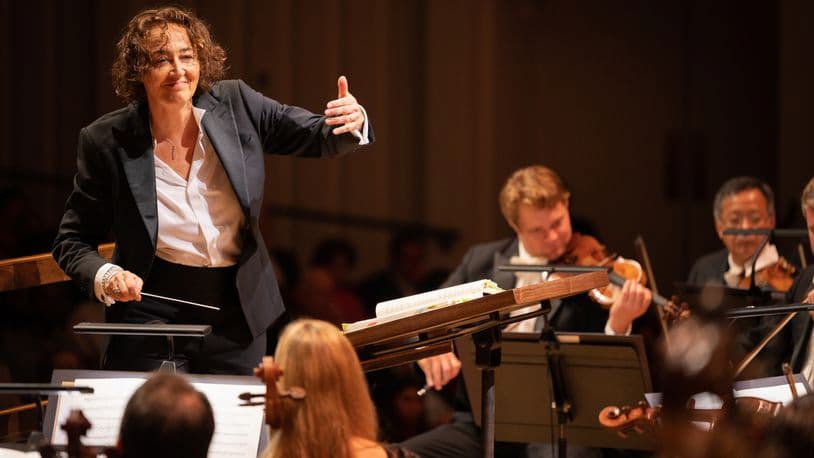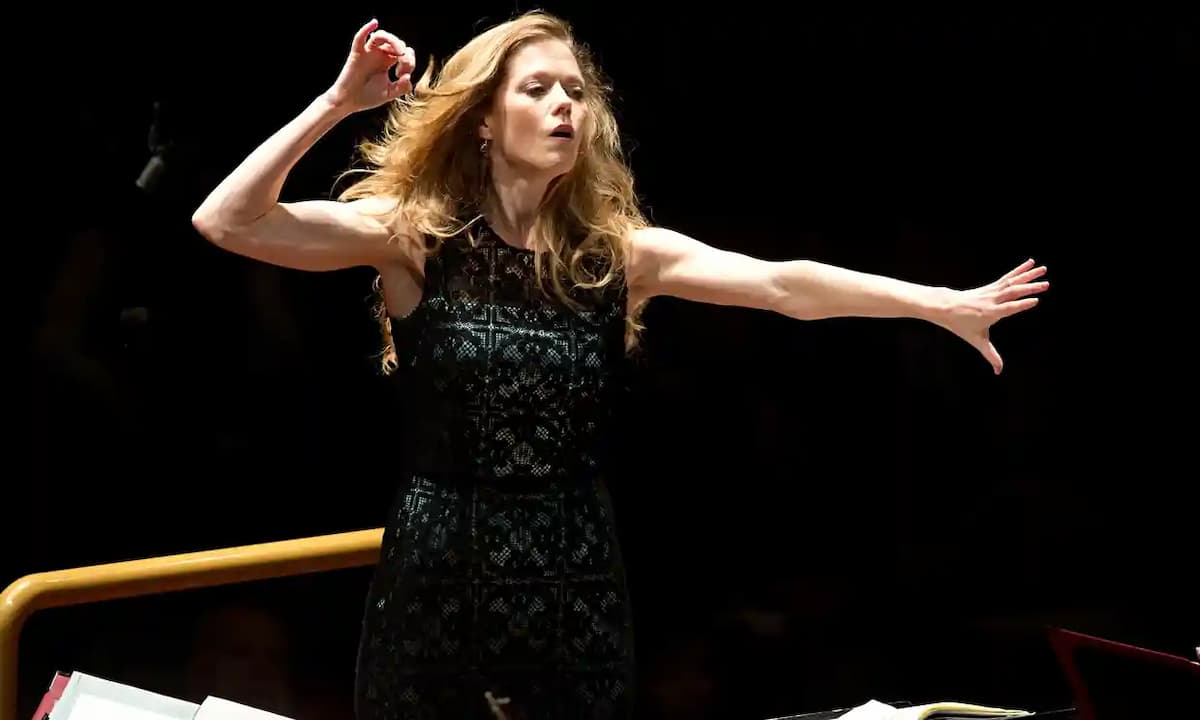“Put your hands up and step away from the podium…” This is the feeling that many musicians have when a prominent soloist appears on stage not in their usual guise, but as a conductor. It’s a bit like trying to be nice to your siblings: sometimes it works, sometimes not. There seems to be no rhyme or reason to its success or failure.
There seems to be this belief among certain soloists-turned-conductors that because there is no instrument in their hand to be practised, or voice to be trained, that the job is much simpler than that of an instrumentalist or singer. If that were the case, though, then surely the majority of conductors would be made up of successful soloists?

Nathalie Stutzmann © The Atlanta Journal-Constitution
They’ve already spent thousands of hours honing their craft, and so all it takes is a little sideways career step, right? As any musician who has been caught in the crossfire of a dodgy soloist-conductor will attest, the reality is not that simple.
There have certainly been moments where, from the safety of the clarinet section, I’ve looked at a hapless conductor and thought, ‘Come on, it can’t be that hard surely? At least not as hard to lead to the kind of mistakes you’re making?!’, thoughts that are often shared by colleagues.
However, conducting, like any art, takes time, dedication, and commitment to perfect. It’s about technique, it’s about managing time and personalities, it’s about many things outside of the music that all take practice: hence why being a brilliant soloist does not mean being a brilliant conductor.
It’s not all doom and gloom though – I’m happy to say that there are soloists who have made the leap onto the podium to great success and acclaim.
Nathalie Stutzmann, once a world-renowned contralto, successfully took up the baton and has built a new wave of her career as a conductor globally in demand. She is Music Director of the Atlanta Symphony Orchestra and Principal Guest Conductor of the Philadelphia Orchestra, along with maintaining guest engagements around the world.
Nathalie Stutzmann Conducts Mozart: Symphony No. 35 “Haffner”
Barbara Hannigan is another singer-turned-conductor. While she maintains more of a balance between conducting and singing compared to Stutzmann, for whom the ‘balance is going to 90% of [her] time as a conductor’, Hannigan has regular conducting engagements worldwide, including with the London Symphony, Munich Philharmonic and Gothenburg Symphony orchestras.

Barbara Hannigan © Musacchio & Ianniello
This didn’t happen overnight, though. As Stutzmann mentions, she is ‘a very hard worker, and with my work, I’m very disciplined and strict,’ and it took her a long time to just be taken seriously in the male-dominated world of conducting.
Both of these soloists didn’t wake up one day and just leap onto the podium. They built their experience through directing and performing (another separate beast “Playing and Directing”) and then consciously decided to branch out further after firstly ascertaining that they wanted to do it, and secondly deciding whether or not they were actually any good at it.
Looking back, the phenomenon of the conductor is a younger one than that of the performer: up until the beginning of the romantic era it was commonplace for there to be no conductor present. If this is the case, and if conducting was born out of performing, you may ask why a great performer doesn’t necessarily make a great conductor.
It is true that, originally, almost all music was led from the front of the first violins (hence the term ‘concertmaster’ or ‘leader’, bestowed upon the leader of the firsts, which is still in use today), and it was only as musical complexity and ensemble size increased throughout the 19th century that a separate figure emerged to keep a handle on music that was becoming freer and more adventurous.
As the music grew and became evermore complex, so did the skills required to direct such music. No longer was it sufficient to have a performer direct; the increasing complexities of harmony, rhythm and tempo required an outside director to coordinate.

© CMUSE
Along with this came the cult of personality, where conductors now not only coordinated the logistics of a piece, but also were expected to offer their own interpretation of specific works. Schools of conducting emerged, with a myriad of styles and techniques becoming ever more refined and diverse over the years.
So, with this in mind, can a soloist simply just become a conductor today? It would certainly be impossible for anyone with little to no experience to jump straight in with something like a Mahler symphony – even if they were a wonderful musician in their own right and had wonderful musical ideas, the mechanics and technique of how to communicate and instigate them would be a huge barrier to success.
It would be like a top psychiatrist trying hip surgery – a brilliant practitioner in their own right but without the necessary skills for the other job (although thankfully in our case the consequences of such a sideways career step are far from catastrophic).
Throughout the industry, there are stories of failure and success, most, if not all, very subjective. This is not a place to diss soloists who have taken up the baton. Talk to any orchestral musician for five minutes and you can get a lowdown of who’s hot and who’s not in that department. With the right training, it is possible – and indeed, some musicians believe that having a director who has proper chops as a practitioner is a massive advantage. It’s just not a given.
So, soloists out there, wherever you are: a little humility and a lot of hard work, and you too, one day, may fulfill your dream of standing on the podium getting glared at by grumpy musicians. As for me? I think I’ll stay tucked away in the woodwind for now…
For more of the best in classical music, sign up to our E-Newsletter

